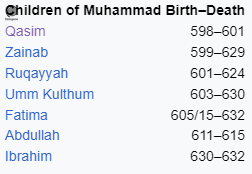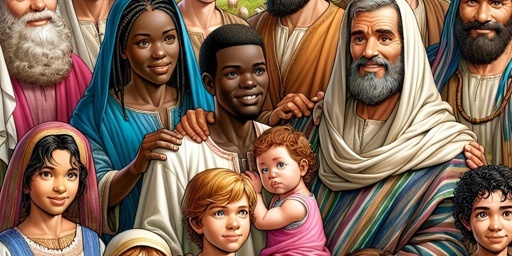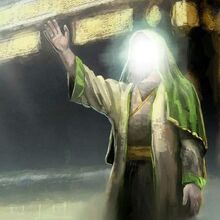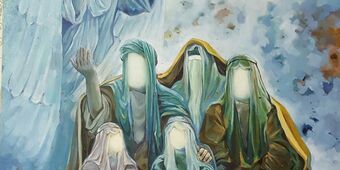Muhammad (Peace Be Upon Him) and His Children
The life and teachings of the Prophet Muhammad (Peace Be Upon Him) hold immense significance in the Islamic faith, shaping the beliefs and practices of millions around the world. Central to his legacy are his children, who played pivotal roles in the early development of Islam and the preservation of his teachings. This article delves into the lives of Muhammad's children, shedding light on the experiences, contributions, and challenges faced by his offspring, particularly focusing on his daughter Fatimah and sons Qasim, Abdullah, and Ibrahim. By exploring the familial ties of the Prophet, we gain a deeper understanding of the familial lineage that continues to influence Islamic history and culture to this day.
The Prophet Muhammad and His Family
Muhammad, known as the last Prophet in Islam, had a beautiful family that played a significant role in the early days of the religion. His children were not just his offspring but also key figures in the history of Islam.
The Children of Muhammad
Muhammad had several children, including Fatimah, his daughter, and sons named Qasim, Abdullah, and Ibrahim. Each played a unique role in shaping the nascent Islamic community and their lineage continues to hold a special place in the hearts of Muslims worldwide.
Role and Contributions of Fatimah in Islamic History
Fatimah, the beloved daughter of Muhammad, led a life of piety and strength. Her marriage to Ali ibn Abi Talib is celebrated in Islamic history for the love and devotion they shared. Fatimah's unwavering support and teachings left a lasting impact on the Muslim community.
Fatimah daugher of Muhammad and her Sons
Fatimah, his youngest daughter, is perhaps the most well-known of his children. She was married to Ali ibn Abi Talib, who later became the fourth caliph of Islam. Fatimah is revered for her piety, wisdom, and devotion to her father. Fatimah and Ali had several children, including Hasan and Husayn, who are considered important figures in Shia Islam. Hasan succeeded his father as the caliph briefly before abdicating in favor of the Umayyad dynasty. Husayn, on the other hand, was martyred in the Battle of Karbala, becoming a symbol of sacrifice and resistance for Shia Muslims.
Muhammad Sons , Qasim Abdullah Ibrahim
Qasim, Abdullah, and Ibrahim, the sons of Muhammad, each had their own unique stories. From Qasim's early years to Abdullah's special place in his father's heart, and Ibrahim's legacy despite his young age, their lives reflect the love and challenges faced by the Prophet's family.# Legacy and Impact of Muhammad's Children in Islamic History
Muhammad's children played significant roles in shaping Islamic history and society. From his daughter Fatimah, known for her wisdom and piety, to his sons Hasan and Husayn, who stood up against injustice, the Prophet's children left a lasting impact on the Muslim community. They were revered for their leadership, knowledge, and devotion to spreading the teachings of Islam.
The values and teachings passed down by Muhammad's children continue to influence Islamic culture and tradition to this day. Their actions and words have served as a source of inspiration for generations, shaping the moral compass of believers and guiding them in their pursuit of a righteous life. The legacy of Muhammad's children remains a cornerstone of Islamic heritage, fostering a deep connection to the Prophet's family and teachings.
Zaynab and Ruqayyah and Ymm Lulthum, Children of Muhammad Rasool Allah
Muhammad's other children also made significant contributions to Islam. Zaynab and Ruqayyah were known for their courage and resilience in the face of adversity.
Umm Kulthum was known for her piety and generosity.

Muhammad's descendants, known as Sayyids or Sharifs, are respected in the Muslim world for their lineage to the Prophet. Many of them have held important religious and political positions throughout history. Some notable descendants include Ja'far al-Sadiq, a prominent Islamic scholar, and Al-Mahdi, a figure believed by Shia Muslims to be the twelfth Imam who will return to establish justice on earth. The legacy of Muhammad's children and their descendants continues to inspire Muslims around the world. Their piety, wisdom, and sacrifices serve as a reminder of the values of Islam and the importance of following in the footsteps of the Prophet. Through their actions and teachings, they have left a lasting impact on the Muslim community and have helped to shape the course of Islamic history. In conclusion, the children of Muhammad Rasool Allah played a crucial role in the spread and preservation of Islam. Their lives and actions continue to be celebrated and emulated by Muslims today. As descendants of the Prophet, they hold a special place in the hearts of believers and serve as a source of inspiration for generations to come.
Challenges Faced by Muhammad's Children After His Passing
Following the death of Prophet Muhammad, his children faced challenges in asserting their leadership and authority within the Muslim community. Amidst power struggles and political rivalries, Muhammad's descendants navigated complex dynamics to uphold the principles of justice and unity that their father had instilled in them.
Political and Social Turmoil within the Family
The period after the Prophet's passing was marked by political and social turmoil within his family, as competing interests vied for control and influence. Muhammad's children grappled with internal divisions and external pressures, testing their resolve and commitment to upholding the legacy of their father in the face of adversity.
The Descendants of Muhammad: Continuing the Prophetic Lineage
Lineage and Genealogy of Muhammad's Descendants
The descendants of Prophet Muhammad, known as the Ahl al-Bayt, form a distinguished lineage tracing back to the Prophet himself. Through marriage and kinship ties, the progeny of the Prophet have preserved their connection to his legacy, serving as custodians of his teachings and values for future generations.
you can visit Muhammad rasool allah profile








